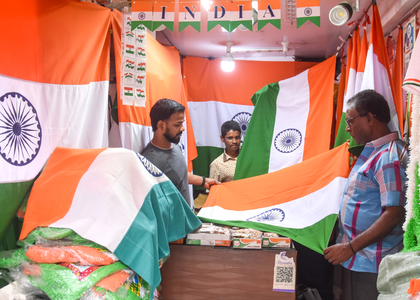Flag hoisting at Mosques made mandatory in Chhattisgarh by Waqf Board
By IANS | Updated: August 12, 2025 18:35 IST2025-08-12T18:25:23+5:302025-08-12T18:35:02+5:30
Raipur, Aug 12 In a first-of-its-kind directive, the Chhattisgarh State Waqf Board has ordered that the national flag ...

Flag hoisting at Mosques made mandatory in Chhattisgarh by Waqf Board
Raipur, Aug 12 In a first-of-its-kind directive, the Chhattisgarh State Waqf Board has ordered that the national flag be mandatorily hoisted at the main gates of all mosques, madrasas, and dargahs across the state on Independence Day.
The circular, issued on Monday by Waqf Board Chairman Dr Salim Raj, instructs 'mutawallis (caretakers of Waqf properties)' to ensure the Tricolour is unfurled in the presence of imams and mosque committee members on August 15.
The Board’s letter emphasises that the national flag is “a symbol of honour and pride” and not linked to any religion.
Independence Day is a national festival, not a religious one, he further said and added that the directive was issued after objections were raised in some quarters about flag hoisting at religious sites.
"Due to the actions of a few fundamentalists, the entire Muslim community is viewed with suspicion. This initiative is meant to change that narrative," he said.
To ensure compliance, the Waqf Board has asked mosque committees to submit photographs or video recordings of the flag-hoisting ceremonies via a dedicated online portal or WhatsApp group within half an hour of the event.
The move is intended to foster patriotism and communal harmony, especially in light of recent incidents that have cast a shadow over the Muslim community’s public perception.
However, the directive has sparked political controversy. Deepak Baij, president of the Chhattisgarh Pradesh Congress Committee, criticised the move, alleging that the BJP is using the flag-hoisting issue for political propaganda.
"The BJP is trying to polarise sentiments by turning a routine patriotic act into a spectacle. The Muslim community has always celebrated Independence Day with pride. There was no need for such a directive unless the intention was to create division and headlines," Baij said.
While several Muslim scholars have welcomed the move as a reaffirmation of national unity, others have questioned the necessity of formalising a practice that is already widely observed.
The directive comes ahead of the 79th Independence Day and is being seen as both a symbolic and strategic gesture in a politically- sensitive climate.
Disclaimer: This post has been auto-published from an agency feed without any modifications to the text and has not been reviewed by an editor
Open in app